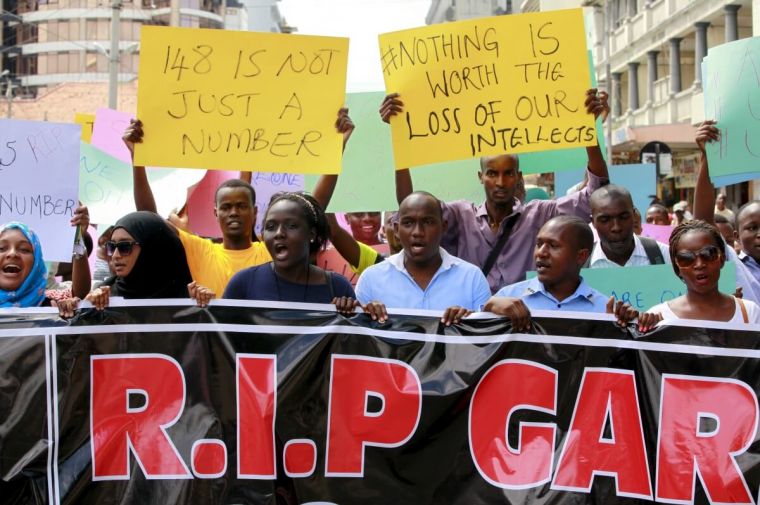The Garissa massacre: Stories from the survivors

"I heard gun shots at 5.50am and I managed to hide in the wardrobe for one and a half days. When I was rescued I found out my roommates did not survive. Because of my tiny wardrobe space, I was unable to walk for two weeks after that but I thank God for sparing my life" – Elsie Karemi.
The world was shocked when news of a massacre on a Kenyan university campus broke over the Easter weekend this year. What wasn't widely reported was that many of the victims, like Elsie, were members of an evangelical student ministry called FOCUS.
The ministry began in the late 1950s, started by Christian faculty at the University of Nairobi. It is now working in 144 universities and higher education colleges. There are 68 staff, including 32 interns, and in total there are 42,000 students in the movement.
Garissa is in Northern Kenya and is the only university campus in that region. The FOCUS group there had 250 students involved, meeting for Bible study, prayer and praise. Like all the student Christian Unions in Kenya they hold their own Sunday services. In a Muslim dominated area both Muslims and Christians wake up early to pray. It was normal custom for CU members to meet at 5am for daily morning devotions.
For many months there had been rumours of an attack on the campus – when an electrical transformer exploded there was a near stampede, and over time fearful students stopped studying in the classrooms in the evenings. There was increased security at the university but it proved to be totally inadequate.
Members of the Somali Al-Shabaab terrorist group – the same group that had launched a deadly attack on Nairobi's Westfield shopping mall – had travelled the 175 km from the border to attack the campus. On April 3, Maundy Thursday , the Christian students had gathered as usual for prayer at 5am. Abwamu Duncan was at the prayer meeting and described a grenade being thrown into the prayer meeting.
As the smoke filled the room, she remembers: "I soon started hearing gun shots in the room. Commotion ensued. Shortly, I saw one sister lying dead in a pool of blood, shot in the head. The louder the gun shots in the room, the louder the CU members prayerd in different tongues. In 10 minutes the voices of people praying had dwindled as the believers were shot one by one."
Abwamu was shot in the arm and lay still while the gun man carried on killing her friends. She says: "I eventually saw him walk out, where I could hear him chat and laugh with other attackers. While he was outside, I decided to smear myself with the blood flowing from the students that lay next to me." This did not prevent her from being shot again; twice, at close range when the attackers came round to check on the bodies. Miraculously, Abwamu was one of five students who survived the prayer meeting shooting. Of her prayer partners, 23 were killed.
While some gunmen attacked the Christian Union prayer meeting, other gunmen headed for the student dormitories to kill students while they slept. Dorcas Musanga, another CU member, managed to survive by hiding in the top of a wardrobe while gunmen used her room as a shooting position. She reflects: "I believe that those who left us have left in Christ and are our martyrs. I believe God has a reason for what happened . It is a great challenge to us Christians because our brothers and sisters have finished the race, what of us who are still alive? Can we stand firm and declare him Lord and Saviour of our lives even at the point of death?"
It seems the gunmen were intent on killing as many as possible. Fleeing students were chased down, some apparently being spared when they declared they were Muslim. In total 147 were killed.
The survivors were taken to Nairobi, either to the mortuary or the Kenyan National Hosptial. FOCUS staff hosted parents who were coming to Nairobi to look for their childre and offered counselling and hospitality. They helped with funeral arrangements. Many of the survivors are suffering from post traumatic stress disorder and some have long-term injuries – two are still in hospital today. The Kenyan students took up an offering to assist the families affected by the tragedy.
The attack had a profound effect on the nation, but especially on the Christian Unions around the country. To this day many students don't want to stay on campus because they are afraid. Christian and Muslim relations remain tense on campus.
Simon Kande, FOCUS deputy national director, says: "We are encouraging Christian students to love their Muslim neighbours and reach out to them with the love of Christ." They are holding on the scriptures to love their enemies.
Simon asks us to pray that the "students remain vigilant in their Christian witness and also prayer for the security on campus and for God to give wisdom to FOCUS as a movement". He ask for psychological healing for the survivors.
FOCUS students have been full of confidence in sharing their faith as the movement has grown, but this tragic event has affected that. But Simon explains that for some students they have been encouraged to be even more bold for Christ.
As I spend time with staff from the Kenyan movement here at the World Assembly of the International Fellowship of Evangelical Students, which gathers students and leaders from 158 nations, I have been so impressed by their vision and passion for the gospel.
Despite the risks and huge challenges they are facing they offer us all a powerful example of faithfulness under fire.
Krish Kandiah is a contributing editor for Christian Today. He is attending the World Assembly of the International Fellowship of Evangelical Students in Mexico.











